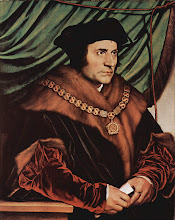I was reading a Townhall.com article today, and it was the second time in three days that someone brought up the name Saul Alinsky in relation to Barack Obama. This prompted me to look up more information about the man who is known as "The Father of Community Organizing," and who was so admired and such an inspiration to Barack Obama that he chose to follow in Alinsky's footsteps and become a community organizer himself. Why I haven't researched the man's life before is really quite beyond me; but I'm glad I didn't, because what little I have read has made me downright sick.
Alinsky was a committed Marxist who saw community organizing as a means of preying on people's fears in order to consolidate power to achieve selfish ends. I wish I could say he was something else, but the man's words speak for themselves. As quoted in his book Rules for Radicals:
"There's another reason for working inside the system. Dostoevsky said that taking a new step is what people fear most. Any revolutionary change must be preceded by a passive, affirmative, non-challenging attitude toward change among the mass of our people. They must feel so frustrated, so defeated, so lost, so futureless in the prevailing system that they are willing to let go of the past and change the future. This acceptance is the reformation essential to any revolution. To bring on this reformation requires that the organizer work inside the system, among not only the middle class but the 40 per cent of American families - more than seventy million people - whose income range from $5,000 to $10,000 a year [in 1971]. They cannot be dismissed by labeling them blue collar or hard hat. They will not continue to be relatively passive and slightly challenging. If we fail to communicate with them, if we don't encourage them to form alliances with us, they will move to the right. Maybe they will anyway, but let's not let it happen by default."
So the key to attaining power is to convince people that things are wrong with the world and that you are an agent for the change they seek. Now who, exactly, does that remind me of? Hmm...actually, quite a few people.
Turns out Obama isn't the only Democrat nominee for President this year influenced by Alinsky. Hillary Rodham wrote her thesis on Alinsky during her senior year at Wellesley. The thesis was entitled There is Only the Fight...:An Analysis of the Alinsky Model. The thesis was inspired by the fact that Alinsky took an interest in her while she was in college and even offered her a position coming out of college (which, though flattered to be offered, she declined). Hillary was so proud of her work and the positions she embraced that during the full 8 years of the Clinton administration she arranged it so that her thesis was declared off-limits to any would-be readers in the Wellesley library (even today, it is only available for reading under the condition that one go to the library in person to view it, though they are not allowed to check the thesis out of the library and they are not allowed to copy more than a few pages).
I could keep going; but the truth is, I'm still reading up on the man myself. Here are a few links for further reading (I was going to include a link to a 2007 Washington Post article detailing Alinsky's influence on both Hillary Clinton and Barack Obama, but within the last few hours the article has mysteriously disappeared from the Post's website):
Wikipedia article
What the Heck is the Alinsky Method?
What is "Sensitivity Training"?
I'll add just a few more points. Already I have seen how the Alinsky Method has been employed by Catholic dissenters at the parish and diocesan levels (and through so-called social justice groups like Call to Action, Pax Christi, FutureChurch, and JustFaith) to push liberation theology on poorly-formed Catholics, intimidate orthodox Catholics (even those in positions of authority) into silence, and manipulate the process of selecting leaders of parish and diocesan sponsored lay groups.
Not that Alinsky had any respect for Catholicism - or organized religion in general. In what is easily his most sickening quote (and that is saying a lot, so brace yourself), he opens his book with an acknowledgement to another rebel from whom he apparently drew inspiration. And lest anyone think this was written early in his career before he became a community organizer, it should be noted that Rules for Radicals was published in 1971, a year before Alinsky's death. Here is the acknowledgement:
"Lest we forget at least an over-the-shoulder acknowledgment to the very first radical: from all our legends, mythology, and history (and who is to know where mythology leaves off and history begins -- or which is which), the first radical known to man who rebelled against the establishment and did it so effectively that he at least won his own kingdom -- Lucifer."
Well, Mr. Alinsky, you may have thought the acquisition of that particular kingdom was a worthwhile venture. I can only pray that you are not now residing in said kingdom.
People might accuse me of quoting only select Alinsky excerpts in order to take them out of context. I challenge anyone to show how, exactly, that comment could be taken out of context - and be sure to include an explanation of how exactly it should have been taken. While you're at it, please explain to me why anyone who would model any part of his own career after this man has any business being President of the United States. God bless!
In Jesus and Mary,
Gerald
Subscribe to:
Post Comments (Atom)





2 comments:
Like I said here, Article
, Simply Evil. There is an ever growing sence of the demonic swirling around this campaign.
Post a Comment